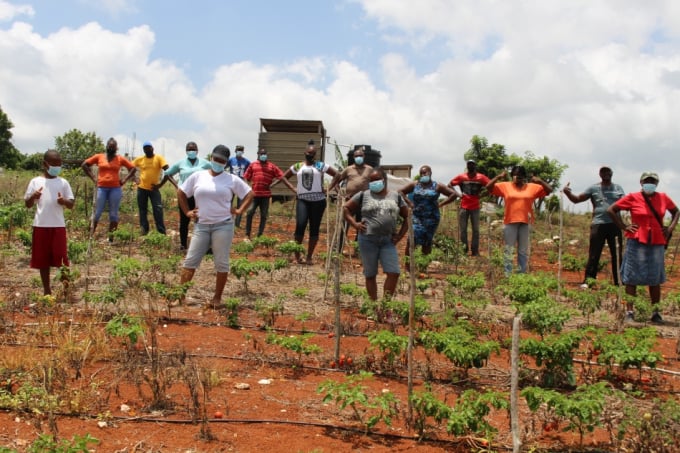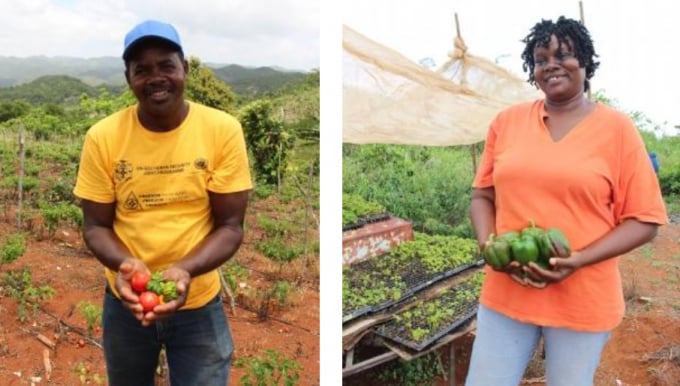June 2, 2025 | 05:17 GMT +7
June 2, 2025 | 05:17 GMT +7
Hotline: 0913.378.918
June 2, 2025 | 05:17 GMT +7
Hotline: 0913.378.918

The farmer field schools have given farmers the techniques and training to extend their production cycles and increase crop production, especially for nutritious foods like fruits and vegetables. Photo: FAO
Nestled in the hills of Clarendon, Jamaica is the home of the Mount Airy Farmer’s Group. For many of these individuals, farming was inherent, a livelihood passed down from generation to generation without question. For Howard Manning, who realised that he wasn’t good at academics and left school, it became an alternative to being unemployed.
“During my youth, I was at a crossroads. I dropped out of school and didn’t see a way out,” said Howard. But his parents had been farmers, so he decided to try it out. “I started farming and today, I have a good income.” He was even able to buy a house and a car, two personal goals, through his farming income. “It has now been 25 years, and I want others to see me as a role model,” says Howard.
Farming has generally been viewed by the younger generation as a “dirty job”, one that takes too long to reap the rewards. However, seeing how much farmers like Howard have achieved is slowly changing this perception, and many have grown to see the importance of this profession.
As a strong leader in his community and the Vice President of the Mount Airy Farmer’s Group, Howard now shares his story with young people and helps out the ones who have started their own farms, advising on good farming practices.
When love is not enough
In spite of their love for farming, Howard and the farmers of the community have had increasing difficulty in accessing proper water resources for their farms in this drought-prone region of the island.
Throughout years of increasingly unpredictable rainfall, the farmers have had to haul water from a nearby pond. However, without individual water storage units, they frequently resorted to purchasing water from trucks, which cuts into their earnings.
“Our biggest challenge is the inconsistent supply of water. We purchase it from a truck or get water from a pond nearby, but it is not enough,” explains Howard.
Despite being the country’s top agricultural region, areas of Clarendon also face soil degradation. Intensive mining of bauxite, Jamaica's major mineral source, has eroded the soil quality, and changing climate patterns have created many challenges for the area’s farmers. The result is that many farms are on plots of reclaimed land with soil nutrient imbalances, high instances of pests and limited water resources.
These challenges could be enough to dissuade anyone from this livelihood. Not wanting that to happen, FAO and the Government of Jamaica’s Rural Agricultural Development Authority (RADA) partnered up on a resilience project to impart new and innovative techniques to farmers.
As part of the United Nations Jamaica Human Security Trust Fund, the project uses the Farmer Field School approach to alleviate the farmers’ water woes. Methods shared include rainwater harvesting, gravity drip irrigation and fertigation (the process of inputting nutrients into the soil simultaneously with irrigation).
“Since receiving support from FAO and RADA, I’ve had greater yields over a longer period of time and now have a steady income from farming alone,” says Euxan Smith, President of the farmer’s group.
With training from the farmer field school, the farmers have been able to control pests in a more affordable and responsible way. It has also helped farmers increase yields by over 35 percent. They now have their eyes set on expanding fruit and vegetable production.
Althea Spencer, female farmer and Treasurer of the group, shares her next vision for the Mount Airy farmers:
“As a group, we see farming as a business, so I want our next step to be agro-processing so that within five years, we are not only farming but also packaging and labeling our own products,” says Althea.
Althea echoes the sentiments of many within the group who are eager to scale up production after the pandemic ends and food supply chain issues ease. Even amidst the reduced access to markets, the long distances to reach customers and restrictions in movement, the Mount Airy Farmer’s Group remains positive about the future of farming and its status as a respectable profession.

Extended drought, water scarcity and soil degradation are the main challenges for the area’s farmers. FAO and Jamaica’s Rural Agricultural Development Authority have taught farmers innovative methods to increase their access to water and build their resilience to climate challenges. Photo: FAO
“I feel excellent being a farmer. If I reap 100 pounds of pepper, there are hundreds of people eating from that crop. I feel good knowing that I am playing a part in feeding the nation,” shares Euxan.
Whilst not a panacea to all the challenges faced by the farmers, the knowledge and support the group has gained from FAO and its partners has significantly improved their livelihoods, and they continue to build on the support they have received.
Today, FAO’s support to the group has spawned the involvement of other entities in providing additional water solutions to farmers in the community. The Mount Airy Farmers’ Group is also in the process of being formally registered with the government as a benevolent society, which will allow them to better mobilise resources and build climate resilience. This dynamic farmer’s group remains a true example of collaboration, diligence and commitment to ensuring the country remains food secure.
(FAO.org)

(VAN) Vikas Rambal has quietly built a $5 billion business empire in manufacturing, property and solar, and catapulted onto the Rich List.

(VAN) Available cropland now at less than five percent, according to latest geospatial assessment from FAO and UNOSAT.

(VAN) Alt Carbon has raised $12 million in a seed round as it plans to scale its carbon dioxide removal work in the South Asian nation.

(VAN) Attempts to bring down the price of the Japanese staple have had little effect amid a cost-of-living crisis.

(VAN) Fourth most important food crop in peril as Latin America and Caribbean suffer from slow-onset climate disaster.

(VAN) Shifting market dynamics and the noise around new legislation has propelled Trouw Nutrition’s research around early life nutrition in poultry. Today, it continues to be a key area of research.

(VAN) India is concerned about its food security and the livelihoods of its farmers if more US food imports are allowed.